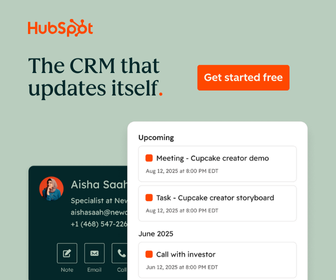Understanding the right CRM for your early-stage startup can feel overwhelming. Maybe you’re not even sure you need one yet. I get it. I’ve been there myself. Every decision feels big when your business is just starting, especially when spending money you might not have.
The truth is, choosing a CRM at the pre-seed stage is about finding a tool that fits your unique journey as an African founder.
That’s why I am writing this article. I want to guide you through the noise and help you see the value a CRM can bring, especially when your team is small and your budget is tight.
If you’re wondering which CRM makes sense for your business, or you’re still on the fence about needing one at all, this guide is for you.
Let’s find the best CRM for African startups together at pre-seed. But first, what’s a CRM?
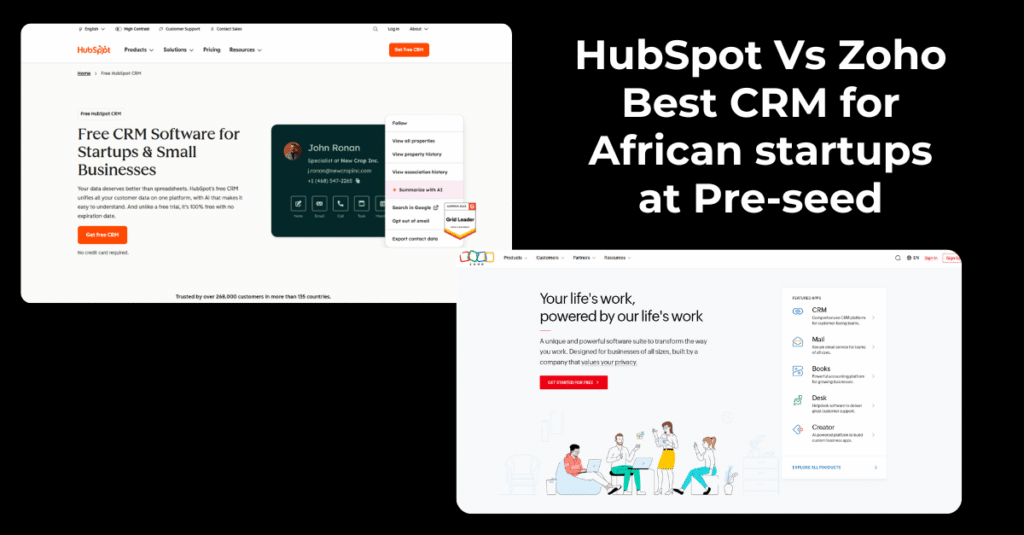
What is a CRM, and do you need one?
A CRM is a tool that helps you organize, track, and nurture every interaction you have with your customers and leads.
For early-stage startups, especially at the pre-seed phase, the idea of getting a CRM might seem premature. After all, you might only have a handful of customers, and spreadsheets or even sticky notes can feel “good enough.”
But the truth is, the earlier you start building a system for managing your relationships, the better positioned you’ll be as your business grows.
Many founders can agree that the right time to get a CRM is when you start losing track of conversations, follow-ups, or potential deals. If you’re finding it hard to remember who you spoke with last week, or you’re worried important leads might slip through the cracks, that’s your sign.
A CRM will help you build business habits and processes that scale. For a pre-seed startup, this means you can focus on what matters most, like building real connections, understanding your customers, and finding opportunities to grow.
Starting early with a CRM can save you from chaos later, and it sets the foundation for a customer-centric business from day one.
But it’s different for an African founder…
In my experience working with startups across Africa, I’ve seen firsthand how unique the challenges can be when adopting a CRM system. Unlike many Western markets, African startups often face hurdles like heavy reliance on mobile communication channels such as WhatsApp and SMS, and tight budgets that make expensive software licenses unrealistic.
I’ve witnessed teams excited to implement a CRM, only to have it abandoned because it was too complex or didn’t fit their daily workflows.
However, African startups still need CRM solutions that are simple, mobile-friendly, and customizable to local business practices. Without addressing these factors, even the best CRM can become just another unused tool.
My goal is to help you navigate these challenges and find a CRM that truly supports your startup’s growth in the African context.
Understanding CRM Needs at Pre-Seed Stage
When choosing a CRM at the pre-seed stage, there are a few key things to keep in mind. First, affordability is a big deal. Budgets are tight for pre-seed startups, so you need a CRM that offers free or low-cost plans without skimping on the essentials.
Additionally, the system should be able to grow with you, adding more users and features as your team expands. You also cannot overlook the ease of use. Your team is small and likely juggling many roles, so the CRM should be simple and intuitive, with minimal setup time.
For African startups, local relevance is critical. The CRM should work well with communication channels like SMS and WhatsApp, and be reliable even when internet connectivity isn’t perfect.
It should also integrate smoothly with the other tools you already use, so you’re not doubling up on work. Lastly, you want a system that can adapt to your unique sales process and customer journey, so do not ignore the aspect of customization.
That said, adopting a CRM early isn’t without its challenges. For instance, integrating data from various sources can be tricky, especially when you’re using informal channels to communicate. Similarly, measuring the return on investment can also feel like a guessing game, making it hard to justify the cost upfront.
And sometimes, CRMs come loaded with overwhelming and unnecessary features at this stage, which only adds to the confusion.
The key is to find a CRM that balances these challenges with your current needs and future goals. The right customer platform will help you streamline your sales and customer management, leaving you to focus on building your product and growing your business.
The CRM landscape in Africa
African startups use customer platforms to streamline operations, improve customer interactions, and drive growth. However, the continent’s unique business environment, with its multiple currencies, diverse languages, and varying internet connectivity, means that CRM solutions must be tailored to local realities to succeed.
African startups face distinct trade-offs when choosing between local and global CRM platforms. Global solutions like HubSpot, Zoho, and Salesforce offer robust features and scalability but often come with higher costs and complexity that may not fit early-stage startups’ budgets or workflows.
We will review HubSpot vs Zoho as the best CRM tools for African startups at the pre-seed stage. I reached this decision as they balance affordability, ease of use, and powerful features tailored to early-stage needs.
HubSpot stands out with its user-friendly, cloud-based platform that combines sales, marketing, and customer service tools in one place. It offers a generous free tier and significant discounts for startups, especially when you are on a tight budget. Many African businesses, especially in Kenya, Nigeria, and South Africa, have successfully adopted HubSpot for customer data management, marketing automation, and improving sales pipelines.
On the other hand, Zoho CRM is widely known for its affordability and scalability. This makes it a natural complement to HubSpot for startups that want a flexible, customizable system that grows with them.
Both platforms offer intuitive interfaces that minimize the learning curve for small teams wearing many hats.
In this article, I’m highlighting solutions that combine global reliability with features and pricing models suitable for African startups at their earliest stages. I aim to help founders build strong customer relationships without overwhelming complexity or cost.
HubSpot vs. Zoho CRM for African Startups at Pre-Seed Stage
HubSpot is an excellent CRM for startups, especially at the pre-seed stage. One of the biggest advantages is its generous free tier, which means you can get started without worrying about upfront costs.
On top of that, HubSpot is easy to set up and use, so you don’t need a technical background or a dedicated IT team to get value from it. Besides, various Hubspot partners in Africa can help you with implementation.
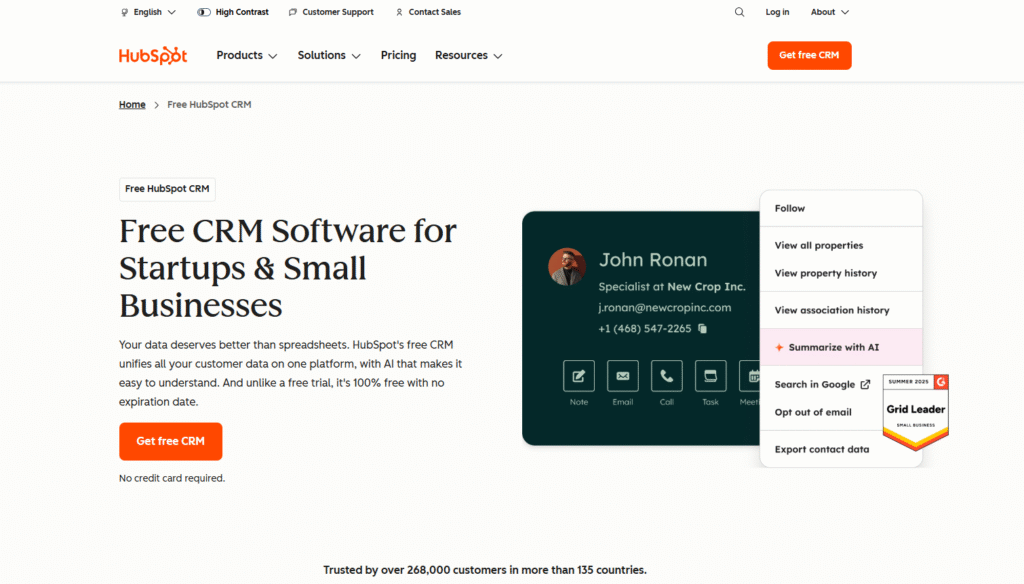
On the other hand, Zoho CRM offers deep customization and long-term scalability on a budget. It’s packed with features and integrates with other Zoho tools, which is great if you want to build a more extensive business suite over time.
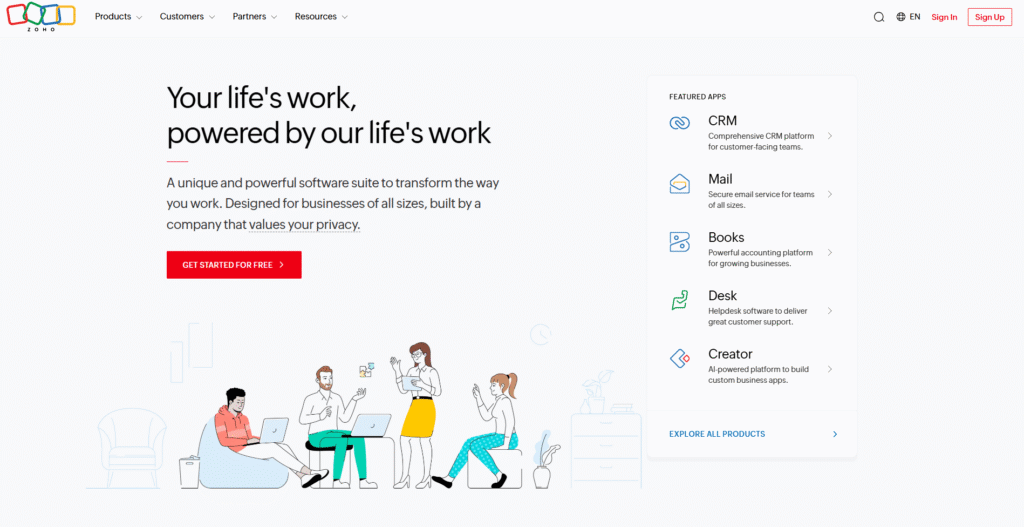
Several users mention that Zoho is more affordable as you scale and offers more flexibility to adapt the system to your unique processes.
However, Zoho can be overwhelming, and you might need help setting it up. But once it’s tailored to your needs, it becomes a powerful engine for growth.
Let’s do a deep dive into HubSpot vs. Zoho CRM for African Startups at the Pre-seed Stage to determine the best tool for you.
HubSpot Vs Zoho: Business Needs and Priorities
Your CRM should serve as a foundation that supports how you operate today while being flexible enough to grow with you. You must, therefore, understand your business needs and priorities when selecting a customer platform.
For many African startups, this means balancing affordability, simplicity, and the ability to handle local realities like mobile-first communication.
HubSpot’s strength lies in upstream marketing workflows and content-driven engagement. This is often ideal if your priority is to build strong, personalized relationships with your customers early on.
However, HubSpot’s pricing often gets steep as you scale, and its customization options are somewhat limited in lower tiers. We will look at this later.
On the other hand, Zoho CRM is built with startups in mind and offers a robust suite of tools at a price point that’s hard to beat. The startup program comes with features to help young companies get off the ground with free credits and access to the entire Zoho ecosystem. This includes everything from CRM to finance and HR tools.
Zoho’s customer platform is valuable if you want a single platform to manage multiple aspects of your business without having to stitch together different solutions.
In addition, Zoho CRM is highly customizable, which lets you tailor your workflows, automation, and data fields to match your unique business processes. Its integration with popular African communication channels and payment systems makes it practical for local realities.
Plus, Zoho’s focus on affordability and scalability means you can start small and expand as your needs grow, without worrying about a sudden jump in costs.
Verdict: In the end, both platforms are powerful, but the choice comes down to your startup’s immediate needs and long-term vision. HubSpot is ideal if you want AI-driven efficiency, simple onboarding, and a focus on marketing and sales automation. Zoho CRM is a strong pick if you’re looking for deep customization, a comprehensive suite of business tools, and a pricing model that supports growth from pre-seed to scale.
HubSpot vs Zoho: Features and Functionalities
When comparing HubSpot and Zoho CRM on features and functionalities for African startups at the pre-seed stage, both platforms cater to slightly different needs and priorities.
HubSpot offers an all-in-one customer platform for small businesses. These include:
- Contact and lead management
- Sales pipeline tracking
- Email automation
- Live chat
- Chatbots
- AI-powered features like duplicate management and lead scoring.
All these tools are designed to help startups automate and personalize customer interactions without a steep learning curve. In addition, HubSpot’s marketing and sales hubs allow you to manage multiple pipelines, automate follow-ups, and get real-time insights through performance dashboards.
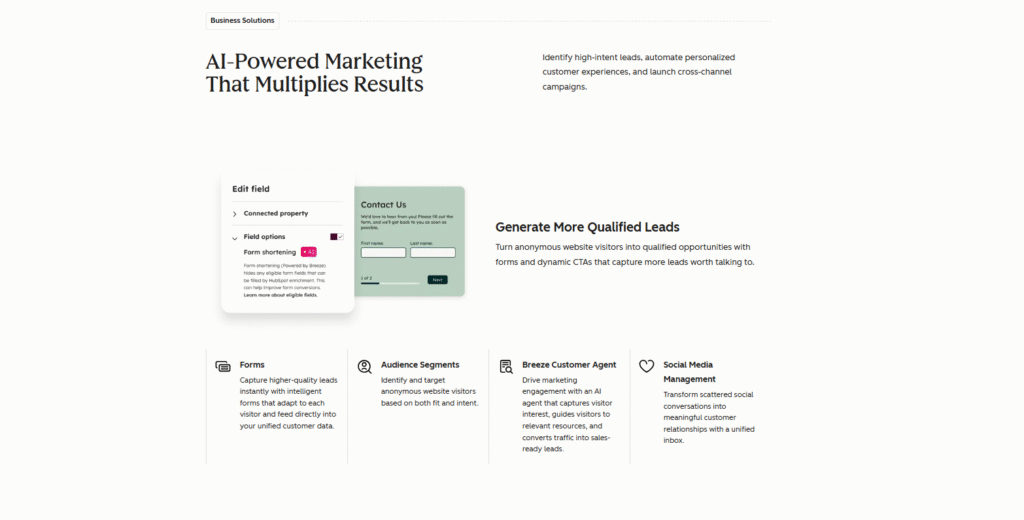
HubSpot’s app marketplace expands your options with integrations for YouTube, Facebook Messenger, WhatsApp (via third-party apps like WhatHub and Twilio), and social scheduling tools such as Hootsuite and Sprout Social. I genuinely appreciate that you can manage direct messaging, automate chatbots, and sync conversations back to your CRM with Hubspot.
However, Hubspot’s free tier is robust, but customization options are limited. Some advanced features, like lead scoring and sales automation, require paid plans.
Additionally, HubSpot lacks certain process automation tools, such as escalation rules and custom validation logic, which may limit flexibility as your business grows.
Meanwhile, Zoho CRM offers a highly customizable and scalable solution if you need more control over your workflows and integrations. Zoho’s startup program provides free credits and access to a broad suite of business tools beyond CRM, including finance and HR. This can be invaluable for managing multiple aspects of your business in one ecosystem.
Additionally, its features include lead and contact management, sales automation, workflow customization, and integration with popular African payment and communication systems. While Zoho’s interface can be more complex initially, its depth allows you to tailor the CRM closely to your unique processes. This is ideal if your startup expects rapid growth or has specialized needs. Zoho’s affordability as you scale also makes it a cost-effective choice for startups planning long-term expansion.
Verdict: HubSpot offers a user-friendly, AI-enhanced platform perfect for startups that want quick setup, marketing automation, and seamless communication tools. Zoho CRM provides deeper customization and a broader business ecosystem for startups that need flexibility and integrated operations.
Both deliver valuable features, but your choice depends on whether you prioritize ease of use and marketing power (HubSpot) or customization and comprehensive business management (Zoho).
Hubspot Vs Zoho: Pricing Model
One thing you’ll notice right away when looking at HubSpot CRM is that the pricing model can be pretty confusing, especially for a startup founder trying to keep costs predictable. This isn’t just my observation; many users, even those with some experience, find themselves scratching their heads over how seats, tiers, and add-ons work.
The main challenge comes from the way HubSpot splits its offerings into different “hubs” (like Marketing, Sales, and Service), each with its own Free, Starter, Professional, and Enterprise tiers.
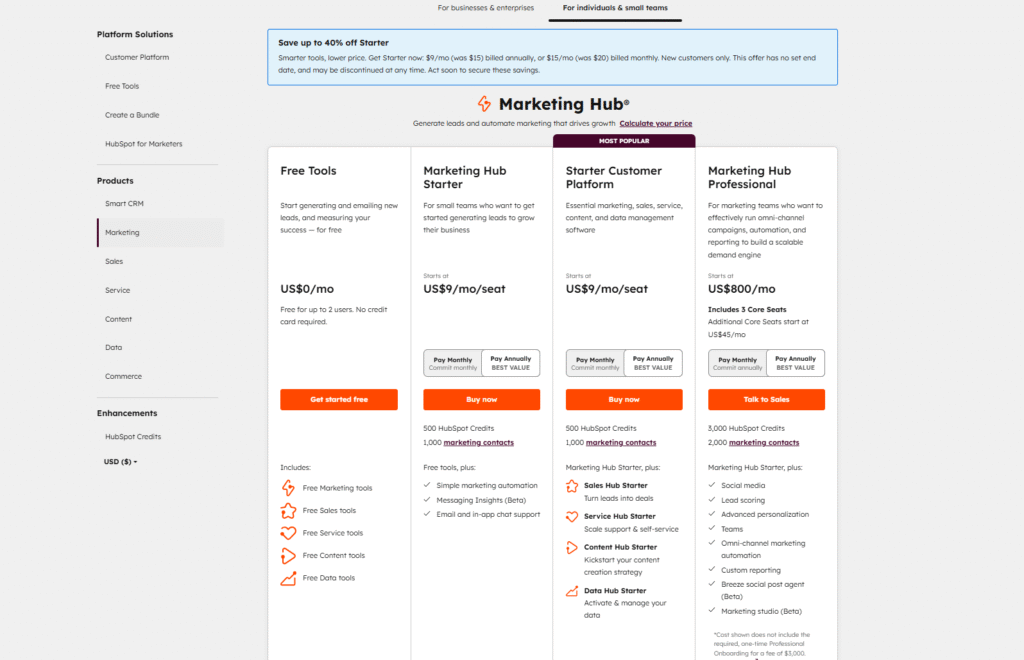
You might start with the free plan, which is genuinely useful and lets you manage up to 1,000,000 contacts with basic CRM features. But as soon as you need more advanced tools, like automation, custom reporting, or multiple pipelines, you’ll find yourself looking at the paid tiers, and this is where things get tricky.
For example, the Starter plan begins at $20 per user per month, or $15 if you pay annually. This plan gives you a step up in features like email automation and more sales pipelines. But if your team grows or you want to unlock advanced features, you’ll need to move to the Professional plan, which can jump to $100 or even $150 per user per month and often comes with a hefty onboarding fee.
There are also limits on the number of marketing contacts, and extra costs if you want to add more. The concept of “core seats” versus “view-only” seats adds another layer of complexity, where core seats are for users who need full access, while view-only seats are free, but not everyone can get by with just viewing data.
For a small African startup, this means you need to be clear about who on your team needs a paid seat and which features you’ll realistically use.
The flexibility is great, but the pricing structure can quickly get complicated as your needs grow, so it’s important to plan and keep an eye on the details to avoid surprises down the line.
On the other hand, Zoho CRM’s pricing model is refreshingly straightforward compared to many other platforms. Zoho offers a free forever plan for up to three users, which is a solid starting point for pre-seed African startups that want to test the waters without any financial commitment.
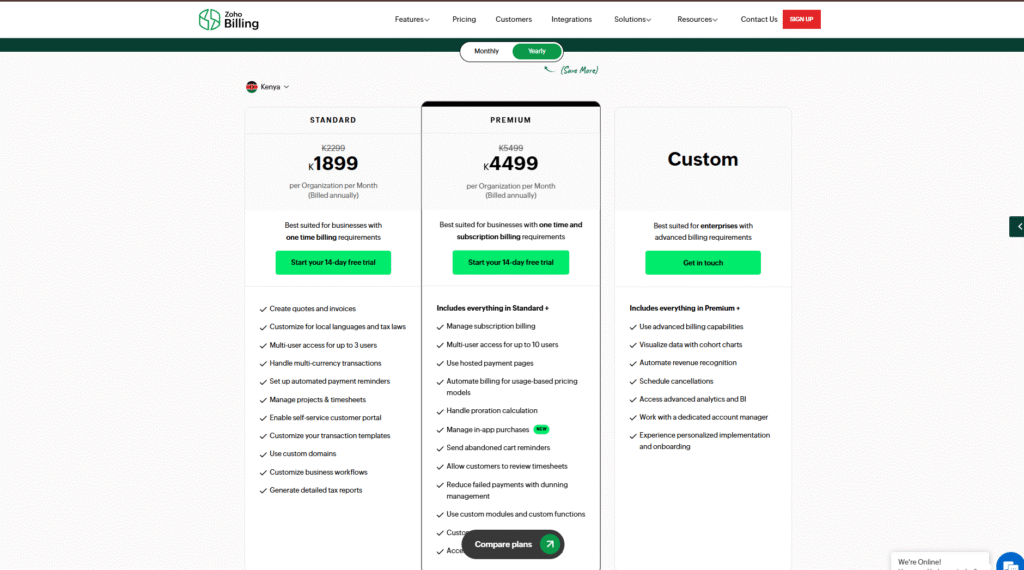
As your team grows or your needs become more complex, you can move up to their paid plans, which are all priced per user, per month.
The Standard plan starts at $14 per user per month (billed annually). This plan gives you access to core CRM features, sales automation, advanced reporting, and integrations with popular third-party apps.
The Professional plan, at $23 per user per month, adds territory management, mass email, and more advanced workflow automation. The Enterprise plan is $40 per user per month and introduces AI-powered tools, advanced security, and a sandbox for testing changes. The Ultimate plan tops out at $52 per user per month and is designed for larger teams that need custom development, integrations, and 24/7 support.
What’s nice about Zoho’s model is the transparency. You know exactly what you’re paying for, and each tier lists the features you get. This makes it easy to budget and plan as your startup grows, without worrying about surprise costs down the line. While Zoho can feel a bit complex to navigate at first, the pricing is genuinely budget-friendly, especially if you opt for Zoho One, which bundles CRM with other business tools for a flat monthly fee.
Verdict: For an African startup at the pre-seed stage, Zoho CRM is generally the better fit thanks to its straightforward and transparent pricing, free plan for small teams, and affordable upgrade paths as your needs grow. While I love HubSpot, the customer platform can quickly become complicated and expensive as you scale or require more advanced features.
HubSpot Vs. Zoho: Automation
Automation helps African startups to save time, reduce manual errors, and ensure every lead or customer gets the right attention at the right moment. This makes it easier to scale your business.
If you’re weighing HubSpot against Zoho CRM for your early-stage African startup, it’s important to consider both cost and access to features.
Many users point out that while HubSpot is intuitive and powerful, its pricing can quickly become a challenge as you grow. HubSpot tends to limit access to certain marketing and automation features in its lower-tier plans. This pricing model is meant to nudge you toward more expensive upgrades as your needs expand. This can be frustrating, especially when you realize that key automation or reporting tools might only be available at a much higher price point.
With HubSpot, you can set up workflows to automate repetitive tasks like sending follow-up emails, assigning leads, and updating records, all triggered by specific customer actions. The platform’s AI-powered tools also let you score leads, nurture them with personalized sequences, automate reminders for meetings, or contract renewals.
You can also create dynamic lists based on behavior, segment your audience, and trigger targeted campaigns across email, SMS, and WhatsApp. Real-time integrations with other systems, like your ERP or Google Sheets, mean your data is always up to date and your team isn’t bogged down by manual entry. These automation features help you respond quickly, build trust, and keep every opportunity moving forward, without needing a big team or deep technical skills.
However, many of us appreciate how Zoho’s automation tools help us streamline repetitive tasks. For instance, lead assignment, follow-up reminders, and email sequences allow small teams to focus on closing deals rather than administrative work.
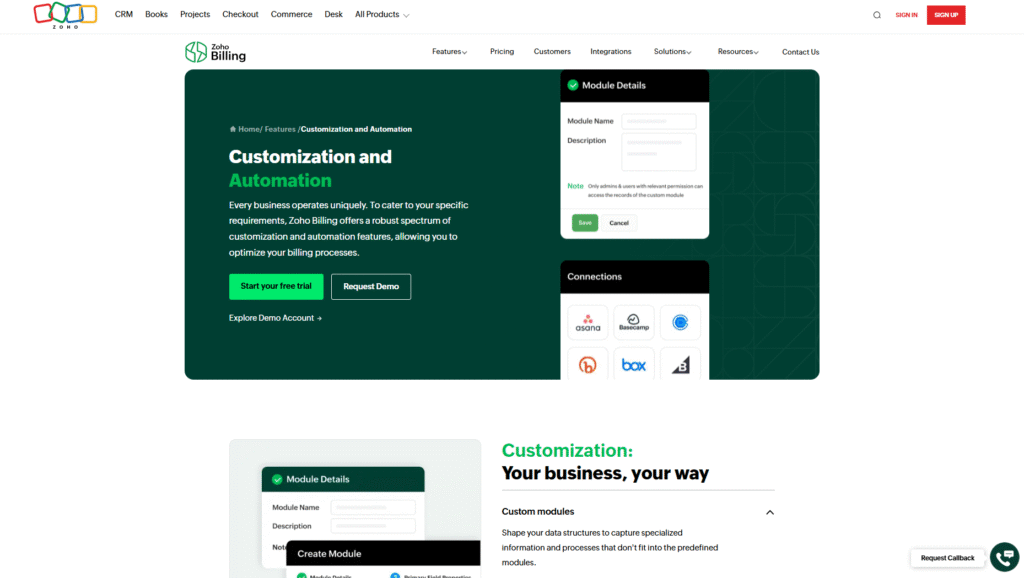
Additionally, Zoho’s workflow automation is surprisingly powerful for its price and offers customizable triggers, alerts, and multi-step processes. This flexibility is especially valuable for startups with unique sales cycles or those adapting to fast-changing markets.
Zoho’s integration with other Zoho suite products creates a seamless flow between sales, marketing, support, and finance functions. This helps startups manage their entire customer journey from one platform.
However, Zoho’s interface can feel a bit overwhelming at first, and the learning curve is worth it, given the boost in efficiency and scalability automation provides.
Verdict: For African startups juggling limited manpower and multiple roles, Zoho CRM’s automation features offer a practical way to grow smarter, faster, and with fewer headaches.
Hubspot vs. Zoho: Integrations
Both platforms offer solid options, but with distinct strengths that matter for African startups at the pre-seed stage. HubSpot boasts an extensive ecosystem with over 1,000 app integrations, covering everything from marketing and sales productivity tools to CMS and customer service platforms.
This wide range of integrations supports a unified workflow to help small teams avoid data silos and automate processes across multiple systems. HubSpot’s native integration with its Marketing, Sales, and Service Hubs also means data flows smoothly between departments. I’ve always found this a big plus for startups aiming to align marketing and sales efforts without juggling separate platforms.
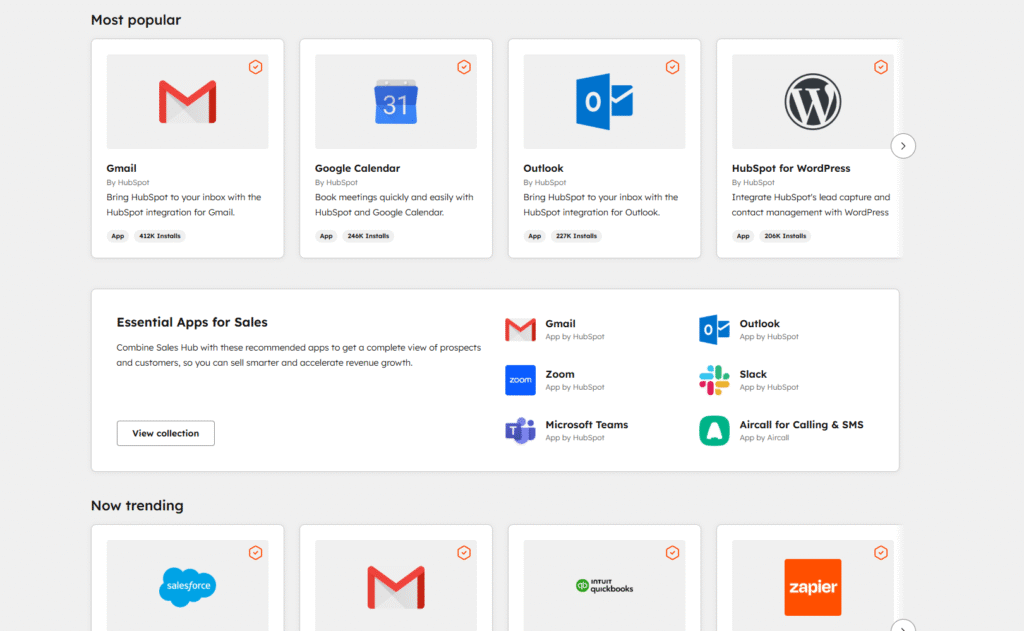
I find Zoho CRM slightly behind HubSpot in sheer number of integrations (around 900+ apps), but it offers a deep connection with the broader Zoho ecosystem. This helps you cover finance, HR, project management, and more.
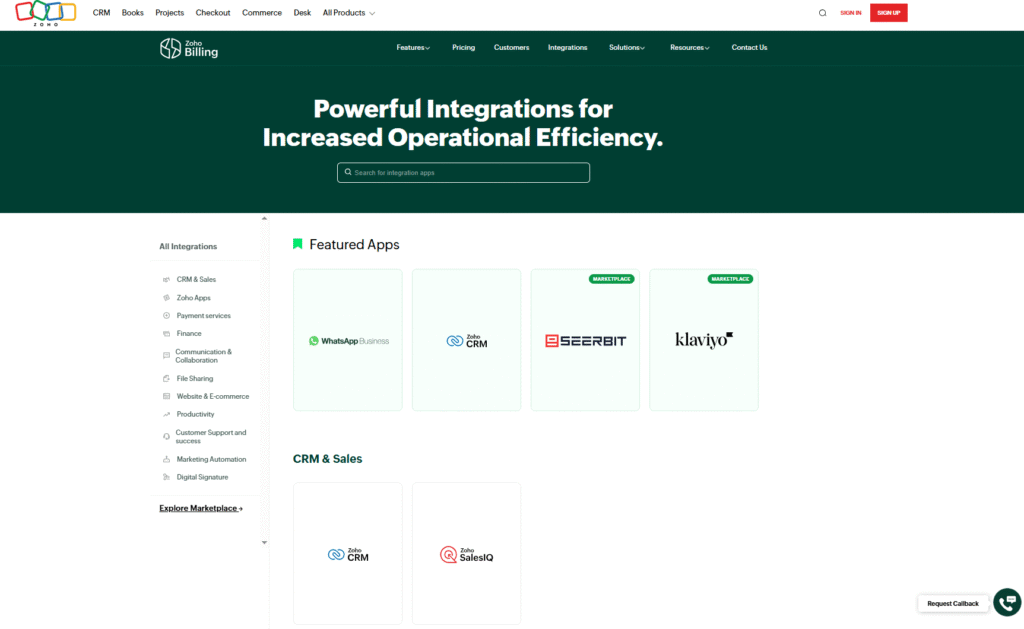
This makes Zoho a powerful all-in-one business suite, especially for startups that want to manage multiple functions from a single platform.
Zoho also integrates well with popular third-party tools like Google Workspace, Microsoft 365, Zoom, Shopify, and local African payment and communication systems. This is crucial for startups operating in diverse markets. Its flexible API and customization options allow startups to build tailored integrations that fit their unique workflows.
Verdict: In summary, HubSpot offers a larger and more diverse integration marketplace. This makes the customer platform ideal if you want to plug into a wide variety of external tools quickly and easily. Meanwhile, Zoho CRM provides tighter integration within its ecosystem and strong support for local business tools. This makes Zoho a versatile choice for startups looking for an integrated business platform beyond just CRM.
Your choice depends on whether you prioritize broad third-party connectivity (HubSpot) or a deeply integrated, customizable business suite (Zoho).
Which is better, HubSpot Vs. Zoho?
Choosing the right CRM at the pre-seed stage is one of the most impactful decisions you’ll make as a founder or product marketer. As we’ve seen, both HubSpot and Zoho CRM bring a lot to the table, but the best choice depends on your unique business needs, growth plans, and the realities of operating in the African startup landscape.
If you value a clean, intuitive interface, quick setup, and strong marketing automation with a generous free tier, HubSpot is a fantastic starting point. This is especially if your early focus is on inbound marketing and building customer relationships fast.
However, keep in mind that costs can escalate quickly as your team grows or your needs become more advanced, so careful planning is key.
On the other hand, if your priority is affordability, deep customization, and the flexibility to manage multiple aspects of your business from a single platform, Zoho CRM stands out. Its transparent pricing, scalable plans, and ability to integrate with local tools make it a practical and future-proof option for African startups that want to grow without surprises.
Ultimately, there’s no one-size-fits-all answer.
Take a close look at your current workflows, budget, and where you want your business to be in the next year or two. The right CRM will not only organize your contacts and sales but also empower your team, streamline your growth, and help you build lasting customer relationships from day one.
Choose the platform that aligns best with your vision and sets your startup up for long-term success.

